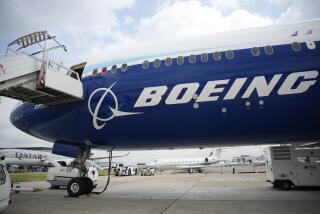Rockwell, Like Much of U.S. Industry Today, Is a Master of Adaptation
- Share via
The campaign goes on, not in politics perhaps, but certainly in business. Donald Beall, chairman of Rockwell International Corp., spoke to investment managers and analysts in four cities in two days last week and adds another two cities this week to spread the message of how the company is taking a risk to try for future growth.
Rockwell is in the process of selling its aerospace and defense business to Seattle-based Boeing Co. for $3 billion and pressing on with businesses doing about $10 billion in yearly sales in factory automation, aviation electronics, semiconductors and modems, truck axles and auto parts.
A boring commonplace of U.S. business, you might think. Shuffling properties, wooing Wall Street investors with the promise of a higher stock price. Defense seems to be on the block these days; Texas Instruments is said to be on the verge of shedding its defense electronics business to concentrate on semiconductors.
Deals make financial sense. Defense properties are selling near their post World War II high prices. Also, defense activities are going to demand fresh investment to go forward technologically.
On the other hand, Rockwell’s--and TI’s--semiconductors demand serious investments, as do just about all of Rockwell’s continuing businesses. Choices had to be made.
But beyond the commonplace of finance, there a more important story in all of this, of U.S. industry’s adaptation to different circumstances and changed technology.
Factory automation long ago moved beyond cartoon-like notions of robots performing simple tasks. Today the sophisticated motors and software that guide machines and processes are more analogous to the human cell system.
“In the body, a cell will attack a bacteria independent of brain commands. The brain does not command each cell; the system depends on each working without formal commands.”
That’s the kind of language used in an instruction paper by Allen-Bradley, a Milwaukee company that Rockwell acquired in 1985 when there was confusion in U.S. industry. The early ‘80s had seen great enthusiasm for “the factory of the future.” Big companies invested billions in robots. But the automation business never took off and by mid-decade companies such as Allen-Bradley were struggling.
When Rockwell bought it, “we told them, ‘We didn’t buy you for today’s results but as a business for the future,’ ” Beall says today. He was Rockwell’s president at the time, and became chairman and chief executive in 1988.
And factory automation has come into its own in the ‘90s, a growing worldwide business that brings Seal Beach-based Rockwell $4.5 billon of its annual sales, earns a 13% operating profit on sales and is growing 8% a year, with increasing business in Asia and Latin America.
There are challenges for both society and the company in factory automation. The equipment and software performing the manufacturing tasks do away with a need for unskilled work. The future “points to a higher percentage of factory workers who are highly educated and highly motivated,” says Allen-Bradley’s paper. Thus, behind the finances of a commonplace business lie all the issues of a trained work force that occupy political debates.
For Rockwell, the challenge will be to keep up with competition and changing technology. But that’s the challenge in all its businesses. In aviation electronics, Rockwell competes to supply Boeing and Airbus Industrie and the electronics for satellites that play an increasing role in global communications.
In semiconductors, Rockwell provides the innards of many cellular phones and makes today’s most advanced modems for Internet access. To keep up, it has to spend more than $700 million a year on research and development and a similar amount upgrading plants and equipment.
Rockwell also has the business it started with in 1919: components for trucks and cars, which in the fiscal year just ended had $3 billion in sales. Automotive is a pretty good business, earning 7% on sales, but it, too, may be sold. “It is not a driver in our growth,” Beall says simply.
Rockwell is striving for 15% growth per year in sales and earnings, Beall is telling investment managers. Achieving such goals is why they pay him the big bucks--more than $2 million a year in salary and bonus.
Sure, that’s only what basketball star Shaquille O’Neill makes in one-tenth of a season. But the leader of a company with 58,000 employees must think also of what others earn in the company and how to attract and hold highly motivated employees.
Rockwell, which will get rid of much of its debt when the Boeing deal is final, is regarded as a success by analysts. “It’s a financially powerful company today with good opportunities,” says Wolfgang Demisch, who analyzes aerospace and technology for BT Securities.
The same could be said for many U.S. companies, which have coped with mergers, acquisitions and pressures for stock performance and now are able to compete in new fields and around the world with technology that is better than most.
The defense industry, too, has managed to shift emphasis from big projects to improving what it has. “Electronics is at the heart of it today, older planes with smarter insides,” says Robert Paulson, head of the aerospace practice for consulting firm McKinsey & Co.
Credit goes to Secretary of Defense William Perry, who is stepping down after four years of adapting to shrinking budgets. “Like Wellington in Spain, Perry has commanded a retreat and brought his army out intact and in better shape,” remarks Demisch.
Similarly, Beall, having brought the company that built the space shuttle through narrowing times for space and defense, is taking Rockwell forward into new fields. One job is done, another challenge begins. There are few rest periods in business these days.
More to Read
Inside the business of entertainment
The Wide Shot brings you news, analysis and insights on everything from streaming wars to production — and what it all means for the future.
You may occasionally receive promotional content from the Los Angeles Times.










